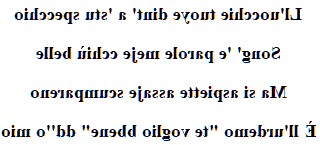Neapolitan love poem
O specchio
Ll'uocchie tuoye dint' a 'stu specchio
Song' 'e parole meje cchiù belle
Ma si aspiette assaje scumpareno
È ll'urdemo "te voglio bbene" dd''o mio


→ French poem ←
Neapolitan language
If after the unification of Italy in 1861, the Tuscan became the official language, the Neapolitan, considered as a language in its own right, remains the second most important language of the country.
Indeed, if you count all its different dialects, the Neapolitan is the language of about 6 million people. After the Roman conquest, the Greek will remain the language of Naples, the Latin being implanted, little by little.
The first written traces in the Neapolitan language (napulitano, Campanian), date from the Xth century.
The Neapolitan is a Romance language (which comes from Latin) and during centuries, has undergone the influences of the many languages that it has coasted, particularly Greek, French and Spanish ... as well as Arabic, Norman and Aragonese.
Napoli
Naples (Napoli) is the capital of Campania, at the foot of Vesuvius. It was first a Greek colony (Neapolis means new city), which succeeds to Parthenope founded in -680.
In -326 the Romans will take the city which will nevertheless keep the mark of its Greek origin. Independent Duchy in the Middle Ages, in 1137 the Normans, will unify all the south of Italy, and if they will give to the port and the city of Naples their importance, their capital will be Palermo.
After the Norman period, it is with the Angevin, that Charles of Anjou, who was dispossessed of Sicily by the Aragonese, will move his capital to Naples. Spaniards, Austrians and French will alternately dominate the city.